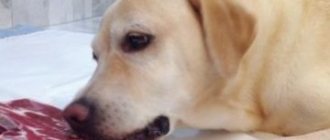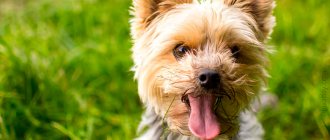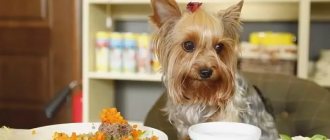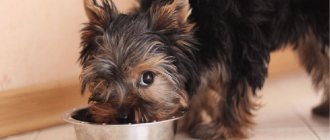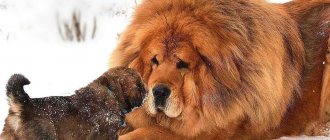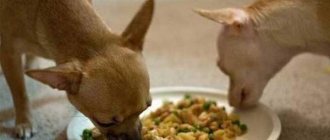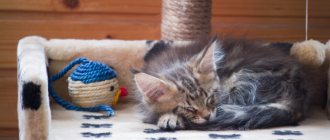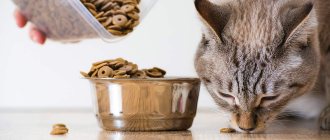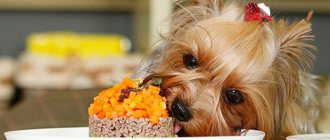| Place | Name | Characteristics in the rating |
| The best dry food for Yorkies |
| 1 | Piccolo Small Dogs Salmon & Venison | The best holistic food |
| 2 | Orijen Adult Dog Fit & Trim Grain Free | The best food for overweight dogs |
| 3 | Grandorf Adult Mini Lamb & Rice | Optimal combination of price and quality |
| 4 | Farmina Natural & Delicious Adult Dog Light Mini & Medium Chicken & Pomegranate Low Grain | Good diet for small and medium breeds |
| 5 | Barking Heads “Doggylicious” Adult Small Breed Duck Hypoallergenic Grain Free | Hypoallergenic food for Yorkshire terriers |
| The best wet food for your Yorkie |
| 1 | Bozita Naturals Dog Reindeer – Chunks in Jelly | The best super premium soft food |
| 2 | Solid Natura Dinner Dog | The best value for money |
| 3 | Berkley Adult Dog Menu №4 Lamb & Rice | Complete soft food |
| 4 | Schesir Dog Chicken with Beef | Canned chicken and beef fillet |
| 5 | "Four-Legged Gourmet" Silver Line | Unusual combination of meat and seafood |
When deciding to own a Yorkshire Terrier, the owner must be prepared to pay for food. This is an indoor, rather capricious breed that requires a balanced diet. All thoughts about economy and premium food can be dismissed immediately. The minimum is a super premium class, and ideally a high-quality holistic product. It is almost impossible for a veterinarian to create a natural diet without knowing all the intricacies of the Yorkshire Terrier’s body. And so that your pet does not get bored with the monotonous taste of “crackers”, the diet can be diversified with wet food. For those who are planning to get a Yorkie, but don’t know what to feed him, a rating of the best dry and wet food has been compiled.
The best dry food for Yorkies
Dry food forms the basis of the Yorkie's diet. Most breeders and owners prefer to feed miniature dogs with them because of their optimally balanced composition. Dry food eliminates the need to create your own diet in order to provide your pet’s body with all the necessary substances. Based on the opinions of veterinarians, reviews from breeders and a detailed analysis of the composition, we have selected the best dry food that is optimal for Yorkshire terriers.
Wellness - dry dog food for small breeds for adults with turkey and oatmeal
- Guaranteed Analysis : Crude Protein 28.0%, Crude Fat 15.0%, Crude Fiber 4.0%, and Moisture 11.0%;
- Calories : 420 kcal/cup;
- First 5 ingredients : 1. Boneless Turkey, 2 Chicken Meal, 3. Salmon Meal, 4. Oatmeal, 5. Ground Brown Rice.
Looking for tasty food for your Yorkie? Well, it's a quality protein and healthy grain-filled dry food from Wellness, formulated specifically for your small breed like your Yorkie. It's made with Omega-3 and Omega-6 fatty acids to help your Yorkie shine. This special chicken and turkey dry food recipe not only supports healthy body weight while maintaining optimal calorie intake. Vitamins A and C provide a boost to the immune system and maximize nutrient absorption in specially formulated oatmeal, turkey and salmon.
Essential vitamins
It is worth understanding that your pet may not receive enough vitamins from natural or special food. This can be especially true in cases where they follow a certain diet or are recovering from an illness or surgery.
The owner must control all this by providing the pet with a sufficient amount of vitamins.
- Vitamins of group A ensure normal growth and development of the body physically, and also affect the formation and maintenance of immunity, resistance to diseases and illnesses.
- Vitamins of group E are responsible for reducing hormonal problems. This vitamin is especially important for pets during puberty.
- Group D vitamins are responsible for the proper metabolism of macroelements in the body, have a positive effect on feed absorption and strengthen the animal’s bones.
- Vitamins of group K affect the proper formation of blood structure, increases coagulation and protection against various types of bacteria
If your pet lacks any of the vitamins, he will develop vitamin deficiency. As a result, a number of disorders occur in the pet’s body, which can lead to more serious diseases.
All food is divided into several age and special groups: for puppies; for adult dogs; for elderly pets; for sterilized animals.
What should you not feed your Yorkshire Terrier?
All canines are predators and their digestive system is not designed to process food from the human table, large amounts of vegetation. Firstly, it contains a lot of salt, spices and fat, and secondly, after heat treatment it is poor in nutrients. Eating such food provokes poisoning, disruption of the pancreas, hair loss and allergic reactions. A separate recipe has not been created for the Yorkshire Terrier, but such products should absolutely not be included in the menu:
- chocolate;
- spicy, smoked, fried;
- fat and lard;
- tubular or boiled bones;
- butter;
- pork;
- onion garlic;
- cow's milk;
- river and spoiled fish;
- buns, cakes, pastries;
- cherry, grape, apricot, plum seeds;
- vinegar;
- mushrooms.
Diet for a pregnant miniature dog
Pregnancy of a pet is an important moment; it is necessary to organize the correct diet for the animal. It is advisable to avoid sudden changes in diet; pregnancy is stressful for the pet and changing the diet can aggravate the pet’s condition. The main part of the menu should be animal proteins. An overweight towards fast carbohydrates and fats can cause excess weight.
It is better to choose premium dog food intended for pregnant females; they have a good composition and contain a balanced set of vitamins and minerals necessary for a pregnant animal. It is important to monitor the portions you consume. Excessive feeding can lead to excess weight gain; there is no need to feed your pet for two or three. Additional weight can weaken the dog’s labor and add increased stress to the internal organs.
In the first half of pregnancy, the animal is fed according to the usual schedule, maintaining the portion size that was before pregnancy. To avoid weight gain, small pets need to remain active, but remember - you should not overwork the animal during pregnancy. If it was decided to switch the animal to another food, then the best time for this is the first half of pregnancy. The transition is carried out smoothly, on average about 8-10 days. If the new food is not suitable for a particular pet, the return to the previous one should be gradual.
In the second half of pregnancy, active growth of puppies in the womb begins; if before this excess nutrition was spent on the pet’s excess weight, now all the excess will go to feed the fetuses. The animal’s body gives all its resources to its offspring. It is important to gradually increase the pet's diet; by the end of pregnancy, the bitch should receive about 30% more food than usual.
There are periods when the female’s appetite decreases or disappears. There is no need to force feed; when the dog feels better, it will begin to eat properly again. During this period, it is better to offer food often and in small portions. During pregnancy, the uterus puts a lot of pressure on the internal organs, and large portions of food will worsen the condition, and a lack of food will provoke the birth of weakened offspring.
Characteristics and composition
Today the pet industry is replete with offers. An inexperienced breeder cannot understand this diversity on his own. To understand which food is better, you should carefully study this issue.
Feed classification:
- holistic;
- premium;
- super premium;
- economy
Topping the list is the holistic class. The advantage of this food is that it contains only natural ingredients. Animal nutrition experts have created unique pellets that perfectly combine taste, quality and value.
Holistics contain protein that is important for pets. Its sources are natural meat and fish. No artificial gluten or protein is used in its production. Potatoes, rice, and lentils were used as carbohydrate doping.
Manufacturers of holistic products paid special attention to the vitamin and mineral complex. The value is maximized compared to premium and economy dry food. Thanks to this, the dog receives the daily norm of useful microelements for a healthy and quality life.
The principle of manufacturers is to use in cooking what people eat.
Expert opinion
Anna Abramenko
An avid dog lover. Experience in veterinary medicine since 2009.
Ask a Question
In holistic food, the percentage of natural protein (meat and fish) is 80%. In economy class - 10%, at best 15.
Holistic food contains everything a dog needs. Strong immunity and shiny coat are only part of the benefits that an animal receives after consuming such a product.
Manufacturers are required to indicate on the packaging a detailed list of components included in the product. Unfortunately, not all substances listed on the label are safe for pets.
Description of the most harmful additives:
- Butylated hydroanisole (BHA, BHA, Butylated Hydroxyanisole, E 320). Synthetic antioxidant, feed preservative. Dangerous for the kidneys and liver, causes allergies.
- Butylated hydroxytoluene (BHT, Butylated Hydroxytolune). Causes the same harm as BHA.
- Digest. This flavoring additive is made by hydrolysis from inedible parts of animals (feathers, wool, hooves, etc.). The ingredient is produced from any remains, including those of animals that died for an unknown reason.
- Yeast. They are used in cheap feeds to enhance taste and add volume, but have no nutritional value and are an allergen.
- Bird or animal fat (tallow). Its quality is not controlled.
- Corn flour. Its composition is poorly digested by the gastrointestinal tract of dogs.
- Metabisulfite sodium is a harmful preservative. Negatively affects the dog's nervous system.
- Milk serum. Strong allergen. Contains poorly digestible lactose.
- Sodium monoglutamate (MSG) is a flavor enhancer for dog food.
- Monosodium phosphate, E339. Often causes diarrhea.
- Propylene glycol. Harmful for animals prone to diabetes. Fish and its by-products, unless the label states that it is not intended for human food. Otherwise, the product contains the dangerous preservative Ethoxyquin (ethoxyquin).
- Carbohydrate sucrose. It causes diarrhea, and with regular consumption, the development of diabetes.
- Beet cake, pulp and other sugar varieties.
- Soy and soy products. This protein is poorly digested and even causes bloating in the dog’s gastrointestinal tract, which means its content should be minimal.
- Meat by-products (animal meal, bones, offal, giblets, etc.) These leftovers are often poorly cleaned of contaminants, chemicals, hormones, and even barbiturates.
- Plant by-products (starch, grain flour, etc.) are not always well digested by dogs and may contain toxins.
- Potassium chloride (Potassium chloride, E 508). Leads to gastrointestinal disorders.
- Ethylene glycol, preservative and sweetener. A source of unnecessary calories leading to excess weight. Lethal in large doses.
- Ethoxyquin. It is carcinogenic and therefore prohibited in the food industry.
Read more: How to choose garden pruners - tips on choosing and selecting characteristics
Unscrupulous manufacturers do not always write the full composition of food ingredients, which means it is necessary to monitor the dog’s body’s reaction.
Veterinarians advise not to skimp on the animal’s health and to choose dog food from holistic or super premium food. After all, they do not use dyes, waste, processed products or harmful components.
Feeding tips for miniature dogs
To maintain the health of a small dog, it is important to consider recommendations and advice on feeding and managing the animal’s diet:
- It is advisable for miniature breeds to eat dry food daily. This is due to the fact that they often experience oral diseases: inflammation of the gums, unpleasant odor from the mouth, loose teeth, and excessive deposits of tartar. Diseases develop faster than in large individuals. Preference is given to holistic feeds; they do not contain dyes, preservatives, or by-products. Dry food reduces the risk of these diseases, but is not a panacea.
- The diet should include wet food. Miniature dogs are prone to diseases of the urinary system; due to their size, the kidneys produce a small amount of urine, which contains a concentration of harmful inorganic substances. Wet food helps saturate the body with additional fluid and prevents the appearance of formations in the urinary system. It is not advisable to mix dry and wet food; it is better to offer them to the animal at different times.
- Do not choose your own nutritional supplements for the animal and do not give food from your table. The advantage of ready-made dry food is its balance. The substances your dog needs are available in the right quantities. Homemade table food contains a lot of salt, fat, spices, and other substances harmful to the animal. A dog whose diet is based on dry food does not need additional biological additives. An excess of vitamins is more harmful than their deficiency.
- Do not overfeed. Small individuals have a tendency to become obese. If you do not control the number of servings in the bowl, then over time the animal may become overweight. On packages of ready-made dry food there is a table on portion sizes and feeding frequency. Compliance with these standards will protect your dog from weight problems.
Nutrition
York is a loyal friend.
The dog requires certain care: diet and diet. The initial stage (up to 1 month) is feeding with mother's milk.
Advantages:
Take the Attention Test! Find 10 differences! (click right here!)
Find the answer Are you bothered by some problem or question? Enter “Breed” or “Name of the problem” into the form, press Enter and you will find out everything about the issue that interests you.
- The puppy’s body’s resistance to diseases;
- No disturbances in the gastrointestinal tract.
From 1 month, feeding is introduced. Use dry food or canned food.
What Yorkies need:
- A complex that contains vitamins for the formation of a beautiful and healthy coat;
- Contains calcium and phosphorus.
It is better to use food for the Yorkshire Terrier labeled “Super-premium”. They have a convenient method of administration - granules in a reduced form. Contains vitamins and microelements for the growth of your pet.
Important information for the owner: read the instructions on the back of the package. There is a table showing the required amount of food for a certain age.
Feeding rules:
- Overeating is unacceptable.
- 20 minutes is the time at which the pet should go to bed.
- Access to clean water (dry feeding).
What is not suitable for the breed: economy class food. Contains excess amounts of dyes and grains. Dogs experience allergic reactions and stomach and intestinal problems.
